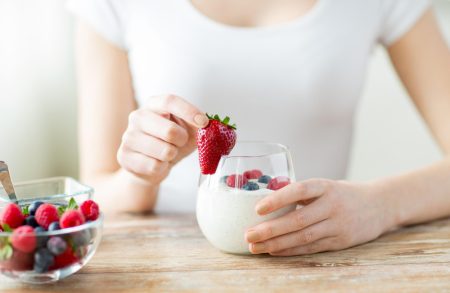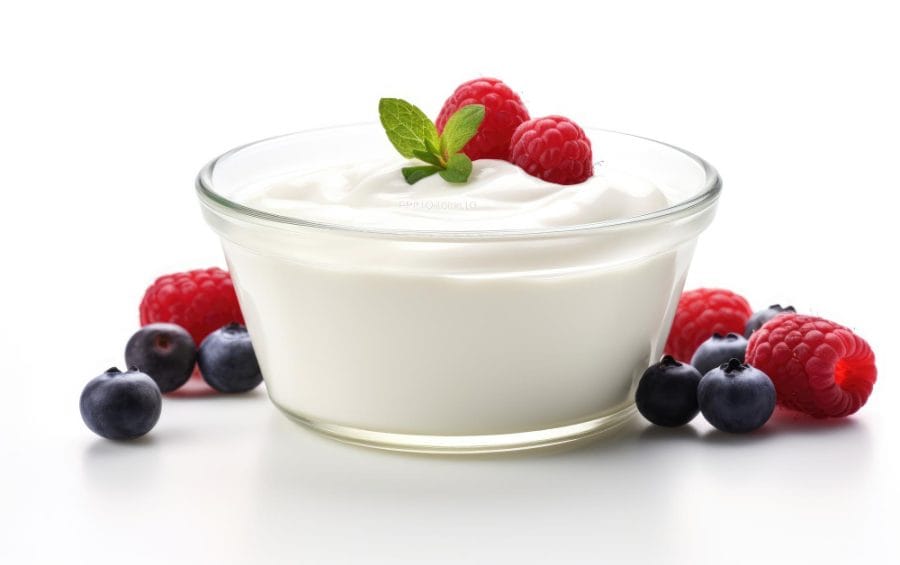Introduction
As we age, our nutritional needs change, and focusing on nutrient-dense foods becomes essential for supporting overall health. Seniors, in particular, benefit from incorporating foods that are rich in protein, calcium, and probiotics—nutrients known to aid bone health, immune function, and digestion. One such powerhouse food that meets these requirements is plain yogurt. Known for its simplicity and versatility, plain yogurt is an excellent choice for older adults, offering a range of benefits that support healthy aging.
Unlike flavored varieties, which often come with added sugars, plain yogurt provides a pure, unadulterated source of nutrition that’s easy to incorporate into any meal. Packed with high-quality protein, calcium, and beneficial probiotics, plain yogurt supports muscle maintenance, promotes healthy bones, and aids digestion—all of which are particularly beneficial for seniors. Its probiotics can also improve gut health, which in turn can help boost immunity and reduce inflammation, factors crucial for maintaining vitality in later years.
This article delves into why plain yogurt is an ideal choice for seniors and provides practical tips on how to incorporate it into a daily diet. Let’s explore how this simple, nutritious food can make a meaningful difference in the lives of older adults.
Affiliate Disclaimer
Our website may include links to affiliate sites. If you click on an affiliate link and make a purchase, we may earn a small commission or receive other compensation at no extra cost to you. Please note that many of the links on our site are affiliate links. Our use of these links does not impact the products, services, or websites we recommend to you. This disclaimer covers all forms of communication with you, including our website, email, phone, social media, products, and other platforms.
Amazon Affiliate Disclaimer
We participate in the Amazon Services LLC Associates Program, an affiliate marketing program that allows us to earn fees by linking to Amazon.com and its affiliated sites. If you click on an Amazon affiliate link on our site and make a purchase, we may receive a small commission at no additional cost to you.
Nutritional Profile of Plain Yogurt
Plain yogurt is a nutritional powerhouse, offering a wealth of nutrients essential for seniors' health and well-being. Its simple, unflavored form allows it to shine as a health-promoting choice that fits easily into a balanced diet, supporting bone health, digestion, immunity, and more.
Protein Content
One of the standout benefits of plain yogurt is its high-quality protein content. Protein is a vital nutrient for muscle health, which becomes increasingly important with age as muscle mass naturally declines. Seniors often experience a condition called sarcopenia, or age-related muscle loss, which can impact mobility and strength. By including protein-rich foods like plain yogurt in their daily diet, older adults can help combat this decline and support better physical function. Plain yogurt can deliver up to 10 grams of protein per serving, offering a substantial contribution to daily protein needs in a convenient and easily digestible form.
Calcium and Vitamin D
Plain yogurt is also an excellent source of calcium, a mineral crucial for maintaining strong bones and reducing the risk of osteoporosis. Bone density tends to decrease with age, leading to a greater likelihood of fractures and bone-related issues. Calcium helps counteract this by promoting bone mineralization, and when combined with vitamin D, it becomes even more effective. Many types of plain yogurt are fortified with vitamin D, which enhances calcium absorption, making this a powerful duo for senior bone health.

Probiotics
One of the most unique aspects of plain yogurt is its probiotic content. Probiotics are live, beneficial bacteria that support gut health by balancing the gut microbiome. A healthy gut microbiome is associated with improved digestion, reduced inflammation, and even a stronger immune system—all of which are essential for healthy aging. Probiotics found in yogurt can also help manage digestive issues like constipation and bloating, which are common among seniors.
Low in Sugar (When Plain)
Plain yogurt offers an added advantage over flavored varieties: it is free from added sugars. Excess sugar consumption can lead to spikes in blood sugar levels and contribute to chronic conditions like type 2 diabetes and heart disease. By choosing plain yogurt, seniors can enjoy a nutrient-rich, low-sugar option that supports stable blood sugar levels and provides a healthier foundation for meals and snacks.
Overall, plain yogurt is a nutrient-dense, versatile food that offers multiple health benefits essential for seniors, making it a smart choice for promoting healthy aging.
Health Benefits of Plain Yogurt for Seniors
Plain yogurt is a simple yet powerful food that offers multiple health benefits, especially for seniors. As we age, the body undergoes changes that can affect digestion, bone density, muscle mass, and immune function. Plain yogurt provides essential nutrients that support these areas, helping to maintain vitality and promote healthy aging. Let’s explore the specific health benefits that make plain yogurt an ideal dietary addition for older adults.
Supports Digestive Health
One of the primary benefits of plain yogurt is its positive impact on digestive health, largely due to its probiotic content. Probiotics are live bacteria that support a balanced gut microbiome, which is essential for proper digestion and nutrient absorption. Aging can slow down digestion and lead to issues like constipation, which can impact seniors' comfort and overall health. The probiotics in plain yogurt help to enhance gut motility, support regular bowel movements, and reduce symptoms of bloating or discomfort.
Additionally, probiotics can improve the body’s ability to absorb essential nutrients like vitamins and minerals, further supporting a balanced diet for older adults. This benefit is crucial as it helps ensure that seniors get the maximum benefit from the nutrients in their food, contributing to improved health outcomes and quality of life.
Boosts Immune System
The immune system weakens with age, making seniors more susceptible to infections and illnesses. However, maintaining a healthy gut microbiome plays a role in supporting immune function, as a significant portion of the immune system is housed in the gut. The probiotics in plain yogurt contribute to a balanced gut environment, which can help strengthen immune responses and reduce inflammation in the body.
Studies show that regular consumption of probiotic-rich foods like yogurt may reduce the frequency and severity of common infections, such as colds and respiratory issues. By incorporating plain yogurt into their diet, seniors may experience improved immune resilience, offering protection against seasonal illnesses and other infections.

Protects Bone Health
As bone density naturally declines with age, seniors are at a higher risk of osteoporosis and fractures. Plain yogurt provides two essential nutrients for bone health—calcium and vitamin D. Calcium is fundamental for bone mineralization, which keeps bones strong and helps prevent fractures. Many types of plain yogurt are also fortified with vitamin D, which aids calcium absorption and directly supports bone health. Together, these nutrients make plain yogurt a smart choice for reducing the risk of osteoporosis and maintaining bone strength.
Since low bone density can lead to a higher risk of fractures, including foods rich in calcium and vitamin D, like plain yogurt, can play a preventive role. This is especially important for seniors who are more prone to falls, making bone health a key aspect of overall well-being and independence.
Aids in Muscle Retention
Seniors face natural muscle loss, a condition known as sarcopenia, which can impact strength, balance, and mobility. Protein intake is essential for maintaining and building muscle mass, and plain yogurt is a rich source of high-quality protein. By consuming sufficient protein from sources like plain yogurt, seniors can better support muscle retention, reducing the risk of frailty and helping to maintain physical function as they age.
In addition to preserving muscle mass, the protein in plain yogurt provides the amino acids needed for cellular repair and muscle recovery, which can benefit seniors who engage in light exercise or physical activity. This combination of muscle support and ease of digestion makes plain yogurt a convenient and effective protein source for older adults.
Balances Blood Sugar
Plain yogurt is an ideal choice for seniors who need to manage blood sugar levels. Unlike many flavored yogurts, plain yogurt is free from added sugars, which can cause rapid spikes in blood glucose levels. The natural proteins in plain yogurt also slow down the absorption of sugars, leading to a more gradual rise in blood sugar and helping maintain stable levels. This is particularly beneficial for seniors with diabetes or those at risk of developing the condition.
Additionally, maintaining stable blood sugar levels can have other benefits, such as reducing inflammation and supporting cardiovascular health. Seniors who incorporate plain yogurt into their diet can enjoy satisfying and nutrient-dense food that aligns well with blood sugar management goals, making it a beneficial addition to both blood glucose control and overall health.
In conclusion, plain yogurt offers a range of health benefits tailored to the unique needs of seniors. From supporting digestion and immune function to protecting bone health and helping manage blood sugar, plain yogurt provides essential nutrients that contribute to healthy aging. Its versatility and nutrient density make it an easy and effective choice for seniors looking to support their overall wellness.
How to Incorporate Plain Yogurt into a Senior’s Diet
Plain yogurt is not only nutritious but also incredibly versatile, making it easy to add to various meals throughout the day. Its mild flavor and creamy texture allow it to be used in both savory and sweet dishes, adding nutrients like protein, calcium, and probiotics. Here are some practical and enjoyable ways for seniors to incorporate plain yogurt into their daily meals, maximizing its health benefits.
As a Breakfast Base
Starting the day with plain yogurt as a breakfast base provides a protein-rich foundation that can be easily customized. Seniors can add fresh or frozen fruits like berries, banana slices, or apple chunks to create a balanced and delicious meal. Fruits are high in fiber, vitamins, and antioxidants, enhancing the nutritional value of the meal and supporting digestive health.
To increase healthy fats, adding a small handful of nuts like almonds or walnuts can be beneficial. Nuts provide additional nutrients, such as omega-3 fatty acids, which support brain health and reduce inflammation. Adding oats or chia seeds offers extra fiber, promoting a feeling of fullness and providing steady energy throughout the morning.
Easy Snack Option
Plain yogurt makes for an excellent snack option, offering a nutrient-dense alternative to sugary or processed snacks. Seniors can enjoy a small bowl of plain yogurt with a sprinkle of cinnamon, which adds flavor and has anti-inflammatory properties. For a slight sweetness without the sugar, a few slices of fresh fruit or a small drizzle of honey can be added.
This snack is not only satisfying but also provides a balance of protein, healthy fats, and fiber, which supports stable blood sugar levels. It’s also portable and quick to prepare, making it convenient for seniors looking for a healthy snack to have on the go.

Savory Ideas
While plain yogurt is often thought of as a sweet treat, it can also be incorporated into savory dishes. It works well as a creamy base for dips, salad dressings, and sauces, adding a rich texture without the need for heavy cream or mayonnaise. For example, seniors can mix plain yogurt with fresh herbs like dill, parsley, or mint to create a flavorful dip for vegetables or whole-grain crackers.
Plain yogurt can also be used as a topping for baked potatoes, soups, or stews, providing creaminess along with added protein and probiotics. Mixing yogurt with spices like garlic, lemon juice, and paprika creates a delicious topping for grilled vegetables, lean meats, or fish, making meals more interesting and nutritious.
Healthy Dessert Alternatives
For seniors who crave something sweet after a meal, plain yogurt can be transformed into a healthy dessert alternative. By combining plain yogurt with a handful of berries and a touch of honey, seniors can enjoy a satisfying, low-sugar dessert. This option provides a delicious and nutritious way to enjoy a treat without added sugars or unhealthy fats typically found in traditional desserts.
Another option is to blend plain yogurt with a bit of cocoa powder and a few slices of banana, creating a chocolatey yogurt treat rich in antioxidants. This not only satisfies sweet cravings but also delivers nutrients that support overall health, making it a win-win for seniors.
Blending Into Smoothies
Plain yogurt is an excellent addition to smoothies, offering a creamy texture and boosting the protein content. Seniors can blend plain yogurt with leafy greens like spinach, fresh fruits, and a handful of seeds for a balanced smoothie that provides a wide range of vitamins, minerals, and antioxidants. Adding plain yogurt to smoothies helps with digestion due to its probiotics and offers a good amount of calcium and protein, supporting both bone health and muscle maintenance.
Smoothies can be a particularly good option for seniors who struggle with chewing or have a decreased appetite, as they can easily consume a nutrient-dense meal in liquid form.
Incorporating plain yogurt into meals is a simple and effective way for seniors to boost their intake of essential nutrients. Whether enjoyed as a breakfast base, snack, savory addition, dessert, or smoothie ingredient, plain yogurt offers a versatile and health-promoting option that supports a balanced diet and encourages healthy aging.
Tips for Choosing the Right Plain Yogurt
Selecting the right plain yogurt can make a difference in maximizing health benefits for seniors. With so many options available, it’s essential to know what to look for on labels and understand the differences in types of yogurt. Here are some practical tips to help seniors (and their caregivers) choose the most nutritious and beneficial plain yogurt.
Check the Label for Live and Active Cultures
One of the main benefits of plain yogurt is its probiotic content, which supports digestive and immune health. To ensure the yogurt has probiotics, look for a label indicating “live and active cultures.” This designation confirms that the yogurt contains beneficial bacteria strains that are still alive and capable of delivering health benefits. Common probiotics found in yogurt include Lactobacillus and Bifidobacterium, which are known to promote gut health and boost immunity.
It’s also wise to read the ingredients list for any unnecessary additives. High-quality plain yogurt should contain only milk and live cultures without added thickeners or preservatives.
Avoid Added Sugars
Plain yogurt is an excellent option because it typically does not contain added sugars, which can have negative effects on blood sugar levels and contribute to conditions like diabetes and inflammation. However, some yogurts labeled as “plain” may still contain small amounts of added sugar or other sweeteners, especially in the “low-fat” or “reduced-fat” varieties. Be sure to check the nutrition facts panel and ingredients list to confirm that the yogurt truly contains no added sugars.
For seniors with a preference for sweeter flavors, it’s better to start with plain yogurt and add fresh fruit or a small drizzle of honey rather than opting for pre-sweetened varieties. This allows control over sugar intake and helps maintain a healthier blood sugar balance.
Full-Fat vs. Low-Fat Options
The fat content in yogurt can vary, with options ranging from full-fat to fat-free. Full-fat plain yogurt contains healthy fats that contribute to satiety and may enhance nutrient absorption, especially for fat-soluble vitamins. Additionally, full-fat varieties tend to have a richer texture and maybe more satisfying, which can appeal to seniors who need calorie-dense options to maintain a healthy weight.
On the other hand, low-fat or non-fat plain yogurt may be a suitable choice for seniors who are managing weight or have dietary restrictions that limit fat intake. It’s worth noting, however, that some low-fat yogurts may contain added stabilizers or sugars to compensate for the reduced fat. Reading labels carefully can help you make a choice that aligns with your health needs and preferences.

Consider Lactose-Free Options
For seniors who are lactose intolerant or experience digestive discomfort with regular dairy products, lactose-free plain yogurt can be an excellent alternative. These yogurts still contain all the beneficial nutrients, such as protein, calcium, and probiotics, but without lactose, the sugar that can cause digestive issues for some individuals.
Lactose-free yogurts often include added lactase enzyme, which breaks down lactose and makes it easier to digest. Seniors who struggle with dairy tolerance can still enjoy the benefits of yogurt by choosing lactose-free versions.
Choose Organic or Grass-Fed, If Possible
When possible, opt for organic or grass-fed plain yogurt. Organic yogurt is made from milk produced without synthetic pesticides, antibiotics, or hormones, which may provide additional health benefits and reduce exposure to certain chemicals. Grass-fed yogurt, produced from the milk of cows that have been primarily grass-fed, may contain higher levels of omega-3 fatty acids and conjugated linoleic acid (CLA), both of which support heart health and have anti-inflammatory properties.
By following these tips, seniors can select the best plain yogurt that aligns with their health needs, ensuring they get maximum nutrition and health benefits from this versatile food. Whether it’s for gut health, bone support, or a balanced snack, choosing the right plain yogurt can support healthy aging.
Precautions and Considerations
While plain yogurt offers numerous health benefits for seniors, there are some considerations to keep in mind. Seniors often have unique dietary needs and may be taking medications that could interact with certain nutrients or components in yogurt. Here are a few precautions and considerations to help seniors safely enjoy plain yogurt as part of a balanced diet.
Be Mindful of Allergies and Lactose Intolerance
One common issue with dairy products is lactose intolerance, which can lead to digestive discomfort such as bloating, gas, or diarrhea. Seniors with lactose intolerance may experience difficulty digesting traditional dairy products, including plain yogurt. However, lactose-free versions of plain yogurt are widely available and provide the same nutritional benefits without the discomfort associated with lactose. These options are made with added lactase enzyme, which breaks down lactose, making it easier to digest.
Additionally, some people may have an allergy to dairy protein, which is different from lactose intolerance. For those with a true dairy allergy, plant-based alternatives like almond, coconut, or soy yogurts can provide a similar texture and experience. Look for plant-based yogurts that are fortified with calcium and contain live cultures to mimic the benefits of traditional plain yogurt.
Be Cautious with Certain Medications
For seniors taking specific medications, it’s important to understand how probiotics in plain yogurt may interact with these treatments. Probiotics can affect the absorption or effectiveness of certain antibiotics, as the live bacteria in yogurt may interact with the medication. To avoid any potential interference, seniors should consider spacing their antibiotic doses a few hours apart from yogurt consumption, allowing each to work effectively without canceling each other out.
Similarly, for seniors taking immune-suppressing drugs or medications that affect gut health, it’s best to consult a healthcare provider before consuming large amounts of probiotics. While probiotics can benefit the immune system and digestion, it’s crucial to ensure that they won’t interfere with specific medical treatments.
Watch Portion Sizes
Although plain yogurt is nutrient-dense, portion control is essential to prevent overconsumption, especially for those watching their calorie intake. While yogurt provides valuable nutrients, large servings can add extra calories, which may be challenging for seniors when managing their weight. A standard serving size is typically about 1 cup (or 150 grams), which can be sufficient to enjoy the health benefits of plain yogurt without overdoing it. Seniors can adjust their portions based on their calorie needs, with smaller servings if desired.
Considerations for Added Ingredients
Plain yogurt should ideally contain only milk and live cultures, but some brands add thickeners, stabilizers, or preservatives. For seniors aiming for the purest option, choosing plain yogurt with minimal additives is recommended to avoid unnecessary ingredients that may impact digestion or overall health. Reading the ingredient list helps ensure that the yogurt remains simple and close to its natural form, offering only beneficial nutrients without extra fillers.
By being mindful of these precautions, seniors can incorporate plain yogurt safely and effectively into their diets. Recognizing potential issues like lactose intolerance, medication interactions, and portion control helps seniors enjoy plain yogurt with confidence, maximizing its health benefits while minimizing any potential risks.
Conclusion
Plain yogurt is a powerful, versatile food that offers numerous health benefits, especially for seniors focused on healthy aging. With its high content of protein, calcium, and probiotics, plain yogurt supports key aspects of senior health, from maintaining muscle mass and strong bones to enhancing digestive and immune function. Unlike many other foods, it provides these essential nutrients in a form that’s easy to digest and incorporate into daily meals, whether as part of a breakfast bowl, a smoothie, or a creamy topping for savory dishes.
Choosing the right plain yogurt, however, is essential to enjoy these benefits fully. Opting for varieties with live and active cultures, no added sugars and minimal additives ensures that seniors get the purest form of yogurt. Seniors with lactose intolerance can still reap the benefits by choosing lactose-free options, and those with dietary restrictions can find alternatives that fit their needs.
Incorporating plain yogurt into a balanced diet is a simple yet effective way for seniors to support overall wellness, helping them to live healthier and more vibrant lives as they age.


